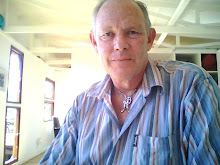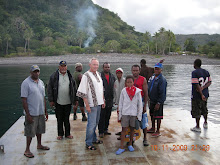The Rev John Williams stepped ashore at Dillon's Bay, Erromango at 09h00 on the 20th November 1939, despite having noted the ominous sign that there were no women or children on the beach.
At 06h30 on the 20th November 2009, John David Williams stepped off the cargo ramp onto the adjoining beach, into a welter of children, dogs, women, men and Chief William. Shaking my hand, he repeated his name, "Little Chief William". There was nothing little about his smile or position in the village. Pastor Bernard led me to his home for "short rest".
Stepped ashore? But I thought we were all flying. Well, that was one of the plans but this is Vanuatu where plans change. The airstrip had been fixed, the planes were arranged. And then the Prime Minister announced that he was putting a military cutter at the disposal of Erromangons living on Efeta who wanted to go home for the ceremony. And the pilots reported that there was one body too many to get the entire Williams party, reporters, communicators and camera crews over in 3 trips with two small planes. And someone remembered by idea of going by boat. In a cave off the Efeta shore (and that's another story) I was given 3 hours to be on board at Star Wharf. Arriving there I found that the military craft had broken down but the PM had chartered a cargo barge and she would sail, not at 17h00 but as soon thereafter as the last passenger may have boarded.
Reunited with Chief Daniel, his wife and two sisters, I made a quick dash to the supermarket for provisions. The Chief guided me to the biscuit shelves from which we filled two baskets. A dozen drinks and bottles of water made up the rest of the carton load. Back on board, I stowed these at the foot of a mountain of luggage, fencing wire, concrete posts, mattresses, agricultural equipment and other things that people take to their families when visiting them from the Big City. In some cases, it was twenty years or more since my fellow passengers had been "home". We were all excited, even the little brown pig who lives in the bow locker.
It was an interesting night as we all vied, politely, for space on, between or under the 6 four-metre benches and the narrow galleyways outside the bridge or the 12 bunks in the 2 x 2 metre "cabin". Between the diesel tanks, the captain's underwear, fishing lines, dustbins and um drums of stuff. The large foredeck was empty of cargo but not much used to us as either rain or spray or both kept it soaking wet all night.
Once underway, there was a general acceptance that the throb of the engines and smashing of blunt bow into wave after wave made it impossible to sing hymns and ballads through the night. While I was greeted, handshaken and even hugged by one welcoming person after another and exchanged shouted exchanges on religion, homelands and weather, the space around my Pilane Leather briefcase on a bench shrank to one haunch width.
Finding a folded tarpaulin next to the pile of belongings in a reasonably dry corner, I tucked my Botswana Blue khikoi around my neck and into my safari jacket, put my neck into the airline cushion, rammed the Ugliest Hat Evva! firmly down over my face and fell asleep. Only to be woken by some kind soul who had brought me a mat to lie on to protect me from the dirt of the tarpaulin. I fell asleep again. Only to be woken by some kind soul telling me that it was my turn in a comfortable bunk. At which stage I found that my jeans were sodden as the boat had started listing slightly to port and the deck was now draining into my corner. Heaving myself into the narrow space of the top bunk, where the diesel fumes collected, I fell asleep; to wake in the panic of claustrophobia. And to find that the sun was rising behind the glowering blur of Erromango. One by one the passengers emerged to lean over the rails and point excitedly at their old home villages (or the jungle where they had been); the tension and happiness mounted. We landed.
The rest of the Williams family were due by 11h00. The planes were more or less on time but the only vehicle on that side of the island capable of climbing the steep hill to the airstrip blew a tire and bent a rim on the first trip down. John and Dorie Travers (in their 70s), Jennifer Williams (30s?) and others, including Viki, James (6) and Eleanor (3 1/2) walked the last few kilometers. Except that poor Jennifer twisted her ankle badly.
Back in the village, the balloons were shrinking, the delicious smell of lap-lap cooking and growing stream of colourful Mother Hubbard dresses and t-shirts (and a couple of rugby jerseys, including a Springbok one) all suggested that there was a party in the making. Eventually, and quite late in the day, all were present and we, the 18 members of the family had been kitted out in Island Green - the girls in full Mother Hubbard and the guys in shirts.
It's still all a blur. Perhaps it will always be a blur. But ...
after sing-sing but before talk-talk, we had Drama. A drama that told the tale that has haunted this community for 170 years. Re-enacted annually. Mentioned at ever turn (e.g. TV weather "and still no rain in Erromango where they killed the missionaries" or on first day at University on Efeta "Don't talk to her, she kills missionaries).
Kids in leaf skirts and garlands playing on the beach. They see a ship (thank you barge Captain). They rush back to the village to report. A dinghy sets out from the ship bearing the Rev John Williams (in broad brimmed hat, bible held high), Mr Harris and two crew members. Hastily the Uswa Chief makes decisions and gives orders. Sandalwood trader have killed 300 natives in the past year or so. Only weeks ago, a ship load of traders came ashore and killed villagers in order to plunder their store of sandalwood. Should the white men in this boat cross this line in the sand, they must be killed.
We, the pale skins in green clothes, stood and watched as the islanders picked coconuts for our ancestor and drew that line in the sand and drew it and drew it an drew it again. We saw him, bible to the fore and ignorant of the meaning of that line, the shouts and gestures step forward for closer greeting. We heard the angry shouts and saw Williams and Harris run for the beach (the Rev carefully dropping his glasses in a safe spot as he ran) and into the river; overpowered and savagely beaten to death, blood darkening the water and their white shirts.
I can't describe just how powerfully this was acted and what impact it had. The bodies were brought ashore. More sing-sing (a hymn sung for generations, telling the story) and then the talk-talk.
Chief William greeted and told us and the children in particular not to "forget the past". Charles Milner-Williams made the key-note speech from the family, a measured, sincere and completely appropriate speech of gratitude, love, undertanding and reconciliation. Michael and David Williams followed with gifts from the family; beautifully engraved tablets commemorating the Reconciliation Day to be placed in the church and in the Missionary graveyard. I followed to present Chief William with a mat from the Chief we'd visited the previous day. And yes, I did grab the opportunity to speak briefly about "seye" (the village language for "respect". No surprises there, really).
And then. And then ...
... oh effword! Led by the actors in full war garb (one of whom was my friendly chief from the boat ride), the present day members of the tribe .... eff-eff-effword. The three leaders ran forward and flung themselves at our feet, wailing and pleading loudly for forgiveness. I don't know. 30, 40, 50 people behind them taking up the plea. Canadian cousin David and I (already established as the two most adamant that "forgiveness" was not what we were here for) couldn't take it. We stepped forward to pull the guys to their feet and ended up in a tangled hug. Still the cries and pleas and wails continued until Charles stepped forward, tears in his eyes, raised his hands high and shouted "People of Erromanga, enough! Please, enough! There is nothing to forgive, but we, the Family of the Reverend Williams, forgive you."
Okay, it all sounds, I don't know, cliched, corny, yucky, whateverish but while I was typing that, Bryony the BBC reporter came over for a chat and said how she had just been watching her tape and how completely stupefying and moving it was. With tears changing to shy smiles and more, what seemd like hundreds (and was certainly well over 100) islanders walked down the family line to shake hands and say "I'm sorry". Each of us muttered our own response. Faces I recognised from the boat or morning's hospitality added hugs to handshake and mutters. Small kids, toddlers and babes in arms were there to be sorry and to be forgiven.
Now, it that isn't enough ... coming on top of the announcement that from now on Dillon's Bay (named after a Sandalwood trader) will be called Williams Bay ... in compensation for the family blood spilled all those years ago, we were presented with ...
... Jaylene, seven years old, beautiful in long white shift and frangipani, tears glistening in her brave eyes as her parents handed her this dumbstruck gaggle of white folk in green clothes. It is kastam, our kalta! Fortunately, Michael and Charles had been given a little bit of warning and rose to the occasion by re-naming our new child "Mary" (biblical and the Rev's wife's name) and handing her back to the custody of her parents whilst promising to that the Williams family will play our part in her upbringing.
And so, Joan, Dave, Craig, Dawn, Pete, Gail, Jess, Nick, Liz and Guy
Mary blong yu-mi.
PS: Please don't tell Madonna.
PPS: It probably won't read that way, but this has been almost as harrowing to type as it was to experience and so I'm not going to proof read or correct. I'm going to have a soothing Tusker.
Friday, November 20, 2009
Subscribe to:
Post Comments (Atom)
.jpg)

No comments:
Post a Comment